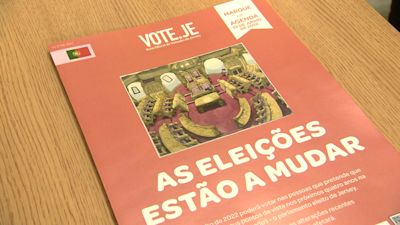Insight
Efforts to boost Portuguese voter turnout in Jersey election

Report by ITV Channel's Jess Dunsdon
Efforts are being made to boost voter turnout among Jersey's Portuguese community at this year's election on 22 June.
It follows a particularly low turnout in 2018, when just 43% of islanders who were registered to vote actually turned out to cast their ballot.
Research commissioned after the last election, showed apathy was worst among islanders who were from Portugal and Madeira. The ComRes survey showed that only 1 in 6 Portuguese nationals voted, compared with 3 in every 4 people from Jersey or the UK.
Nelia Frango, a florist in St Helier's market, is one islander who despite living in Jersey for 30 years, is yet to vote in an island election.
"I would need to go to the past and learn all about the parties for then to decide who to vote for," she says. "I don't understand politics so that's why I don't vote."
Lack of knowledge about the system, disillusionment with the candidates, a feeling of not belonging and a lack of representation are other reasons given for not voting.
Mauricia Martins who works in Alfonso's cafe said: "I don't know nothing about vote. I don't watch English news and there's no point voting if I don't understand which one is good for Jersey. That's why I don't vote."
Mario Rodrigues, who is a salesman, said: "I think the government is out of touch, it doesn't really matter if it's Portuguese, Polish, or just any other person who works or lives in Jersey. They promise things and when it comes to it, they don't do anything about it."
Fausto Duarte does not feel he should vote, as he does not see his future in Jersey.
"I've worked here for the last 20 years but I feel my vote is not important, because one day I may go back to Portugal and do my job there."
Beatriz Moreno-Poree was born in Angola, a Portuguese colony in Africa. She is now a political campaigner, after moving to the island 30 years ago. But she says it took her a long time to engage in local politics.
"You're very aware that while you're in that country, you are a guest, you come in for a reason. So therefore when it comes to politics, the politics of the country where you are as an immigrant, often people don't feel it is really for them to get involved.
"Or sometimes they don't feel they understand the system, especially in Jersey where the Portuguese community has a different language."
Under-representation in Jersey's current government is also a factor, according to some.
Carina Alves is the only politician of Madeiran or Portuguese heritage, which equates to one out of 49 States members.
This is something Beatriz thinks stops the local community from connecting with their elected politicians, considering one in 12 people in the island are from Madeira or Portugal.
"The disconnection is going to be much greater because it's all about looking at yourself and seeing the person who is representing you and the physical features, the speech, the culture are very important because that's what makes us identify with others isn't it?"
The States Greffe has recognised the apathy in the Portuguese community and other minority groups and has worked to address the problems.
What changes are being made for this election?
Election leaflets and posters are available in other languages, explaining Jersey's political system, how to register and how to vote.
Manifestos on vote.je are available in several different languages.
Information is being shared with candidates about how to get their content translated.
Working with community leaders to reach out to minority groups
A campaign was launched in 2021 to encourage and support people from under-represented demographic groups to stand for this year's election
The island-wide campaign strapline has been translated into multiple languages.
Two major barriers voters spoke about in 2018 were that islanders did not understand the system and that they felt they did not know the candidates well enough to vote.
This year, the States have released a video on YouTube which can be translated, to help islanders understand the system in place.
Jenny O'Brien, Head of Public Engagement at Jersey's States Assembly said: "Our work does not stop on the 22nd of June. It's going to be throughout the political cycle, helping to understand the challenges and the barriers that people are experiencing and how we can help them.
"Also, how we can help them feel included in Jersey society, that's absolutely key to really getting a fully inclusive democracy."